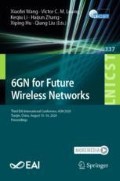Abstract
Platoons, formed by smart vehicles driving in the same patterns, bring potential benefits to road traffic efficiency while providing a promising paradigm to execute computation tasks with onboard computing resources. However, constrained resources of individual vehicles (IV), limited wireless coverage of vehicular communication nodes as well as high mobility of running platoons pose critical challenges on task scheduling and resource management. To address these challenges, we propose a platoon-based vehicular edge computing mechanism, which exploits computation capabilities of both platoons and edge computing enabled Roadside Units (RSUs), and jointly optimizes task offloading target selection and resource allocation. Taking aim at minimize delay cost and energy consumption of the platoon-based task execution, we leverage deep deterministic policy gradient (DDPG) to design a learning algorithm, which efficiently determines target computation servers and obtains optimized resource scheduling strategies. Numerical results demonstrate that our algorithm significantly reduces delay and energy costs in comparing its performance to that of benchmark schemes.
Supported by organization x.
Access this chapter
Tax calculation will be finalised at checkout
Purchases are for personal use only
References
Li, W., Zhu, C., Leung, V.C.M., Yang, L.T., Ma, Y.: Performance comparison of cognitive radio sensor networks for industrial IoT with different deployment patterns. IEEE Syst. J. 11(3), 1456–1466 (2017). https://doi.org/10.1109/JSYST.2015.2500518
Alam, K.M., Saini, M., Saddik, A.E.: Toward social internet of vehicles: concept, architecture, and applications. IEEE Access 3, 343–357 (2015)
Huang, C., Chiang, M., Dao, D., Su, W., Xu, S., Zhou, H.: V2V data offloading for cellular network based on the software defined network (SDN) inside mobile edge computing (MEC) architecture. IEEE Access 6, 17741–17755 (2018). https://doi.org/10.1109/ACCESS.2018.2820679
Zhou, H., et al.: TV white space enabled connected vehicle networks: challenges and solutions. IEEE Netw. 31(3), 6–13 (2017). https://doi.org/10.1109/MNET.2017.1600049NM
Choo, S., Kim, J., Pack, S.: Optimal task offloading and resource allocation in software-defined vehicular edge computing. In: 2018 International Conference on Information and Communication Technology Convergence (ICTC), Jeju, pp. 251–256 (2018). https://doi.org/10.1109/ICTC.2018.8539726
Liu, P., Li, J., Sun, Z.: Matching-based task offloading for vehicular edge computing. IEEE Access 7, 27628–27640 (2019). https://doi.org/10.1109/ACCESS.2019.2896000
Wang, H., Li, X., Ji, H., Zhang, H.: Federated offloading scheme to minimize latency in MEC-enabled vehicular networks. In: 2018 IEEE Globecom Workshops (GC Wkshps), Abu Dhabi, United Arab Emirates, 2018, pp. 1–6 (2018). https://doi.org/10.1109/GLOCOMW.2018.8644315
Xu, X., Xue, Y., Li, X., Qi, L., Wan, S.: A computation offloading method for edge computing with vehicle-to-everything. IEEE Access 7, 131068–131077 (2019). https://doi.org/10.1109/ACCESS.2019.2940295
Nguyen, K.K., Duong, T.Q., Vien, N.A., Le-Khac, N., Nguyen, L.D.: Distributed deep deterministic policy gradient for power allocation control in D2D-based V2V communications. IEEE Access 7, 164533–164543 (2019). https://doi.org/10.1109/ACCESS.2019.2952411
Qi, Q., et al.: Knowledge-driven service offloading decision for vehicular edge computing: a deep reinforcement learning approach. IEEE Trans. Veh. Technol. 68(5), 4192–4203 (2019). https://doi.org/10.1109/TVT.2019.2894437
Loh, K.H., et al.: Solving the maximum cardinality bin packing problem with a weight annealing-based algorithm. Oper. Res. Cyber Infrastruct. 47, 147–164 (2009)
Roess, R.P., Prassas, E.S., McShane, W.R.: Traffic Engineering, 3rd edn. Pearson/Prentice Hall, New Jersey (2004)
Rappaport, T.S.: Wireless Communications: Principles and Practice, 2nd edn. Prentice Hall: Englewood Cliffs, New Jersey (1996)
Jan, P., Stefan, S.: Reinforcement learning of motor skills with policy gradients. Neural Netw. 21(4), 682–697 (2008). https://doi.org/10.1016/j.neunet.2008.02.003
Konda, V.R., Tsitsiklis, J.N.: Actor-critic algorithm. In: NIPS, vol. 13, pp. 1008–1014 (1999)
Reimplementation of DDPG (Continuous Control with Deep Reinforcement Learning) based on OpenAI Gym + Tensorflow. https://github.com/songrotek/DDPG. Accessed Dec 2019
Author information
Authors and Affiliations
Corresponding author
Editor information
Editors and Affiliations
Rights and permissions
Copyright information
© 2020 ICST Institute for Computer Sciences, Social Informatics and Telecommunications Engineering
About this paper
Cite this paper
Chen, Y., Hu, X., Chai, H., Zhang, K., Wu, F., Gu, L. (2020). Deep Reinforcement Learning-Based Joint Task Offloading and Radio Resource Allocation for Platoon-Assisted Vehicular Edge Computing. In: Wang, X., Leung, V.C.M., Li, K., Zhang, H., Hu, X., Liu, Q. (eds) 6GN for Future Wireless Networks. 6GN 2020. Lecture Notes of the Institute for Computer Sciences, Social Informatics and Telecommunications Engineering, vol 337. Springer, Cham. https://doi.org/10.1007/978-3-030-63941-9_6
Download citation
DOI: https://doi.org/10.1007/978-3-030-63941-9_6
Published:
Publisher Name: Springer, Cham
Print ISBN: 978-3-030-63940-2
Online ISBN: 978-3-030-63941-9
eBook Packages: Computer ScienceComputer Science (R0)

